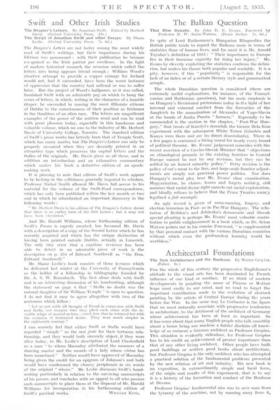Swift and Other Irish Studies
The Drapier's Letters. By Jonathan Swift. Edited by Herbert Davis. (Oxford University Press. 21s.) The Script of Jonathan Swift and other Essays. By Shane Leslie. (Oxford University Press. 7s. 6d.) The Drapier's Letters arc not today among the most widely read of Swift's writings, but their importance during his lifetime was paramount ; with their publication he became recognized as the Irish patriot par excellence. In the light of modern historical research the occasion which called the letters into being appears trivial enough ; William Wood's abortive attempt to provide a copper coinage for Ireland Would not, had it succeeded, have been the worst instance of oppression that the country had suffered or was to suffer later. But the project of Wood's halfpence, as it was called, furnished Swift with an admirable peg on which to hang the series of letters, in which, writing in the character of a humble draper, he succeeded in rousing the most illiterate citizens of Dublin to the consciousness of their position as Irishmen in the thraldom of an alien race. • The letters are magnificent examples of the power of the written word and can be read with great pleasure today, especially in this handsome and valuable volume, which we owe to the industry of Mr. Herbert Davis of University College, Toronto. The standard edition of Swift's prose works has latterly been that of Temple Scott, which has many Merits, but The Drapier's Letters can only be properly savoured when they are decently printed in an attractive type which preserves the capital letters and the italics of the originals. Mr. Davis gives us all these, and in addition an introduction and an exhaustive commentary which makes his book a definitive edition of an epoch- making work.
It is pleasing to note that editors of Swift's work appear to be lacking in the selfishness generally imputed to scholars. Professor Nichol Smith allowed Mr. Davis full access to his material for the volume of the Swift-Ford correspondence, which has only been published within the last month or two and in which he adumbrated an important discovery in the following words : " Mr. Herbert Davis in his edition of The Drapier's Letters shows that there is an earlier form of the first Letter ; but it may not have been circulated."
And Mr. Harold Williams, whose forthcoming edition of Swift's Poems is eagerly awaited, has favoured Mr. Davis with a description of a copy of the Second Letter which he has recently acquired and which has the unique distinction of having been printed outside Dublin, actually in Limerick. The only tiny error that a captious reviewer has been able to detect in an admirable piece of work is the description on p. 254 of Edward Southwell as " the Hon. Edward Southwell."
Mr. Shane Leslie's book consists of three lectures which he delivered last winter at the University of Pennsylvania as the holder of a fellowship in bibliography founded by Dr. A. S. W. Rosenbach. The first alone deals with Swift and is an interesting discussion of his handwriting, although the statement on page 4 that " Stella no doubt: was the natural daughter of Sir William Temple " is open to question. I do not find it easy to agree altogether with two of the sentences which follow : " Let us put aside all thought of Freud in connexion with Swift and Stella, nor imagine that they plied each other with the in- visible whips of mental sadism ; much less that he tortured her with the scorpion of frustrated desire. They wore much simpler in the eighteenth century."
I can scarcely feel that either Swift or Stella would have regarded " simple " as the mot jusfe for their tortuous rela- tionship, and they would both sincerely object., if they were alive today, to Mr. Leslie's description of Lord Chesterfield as a man " to whom Macaulay attributed the manners of a dancing master and the morals of a lady whose virtue has been monetized." Neither would have approved of Macaulay being given the credit for an epigram of Johnson's and both would have condemned the clumsy periphrasis in six words of the original " whore." Mr. Leslie discusses Swift's hand- writing particularly in relation to the surviving manuscripts of his poems, and concludes with an appeal to all who possess such manuscripts to place them at the disposal of Mr. Harold Williams for incorporation in his forthcoming edition of
'






































 Previous page
Previous page